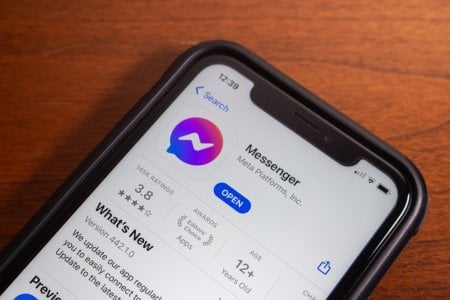Meta announces major changes to Messenger app
By
VanessaC
- Replies 14
As we continue to navigate the vast digital landscape, maintaining our privacy online is becoming ever more significant.
Considering the ever-present threats lurking online, those behind websites like Facebook are constantly under pressure to secure users.
For the one billion people using Facebook’s Messenger app around the globe, major updates are poised to make their private conversations even more secure.
Meta, the company that owns Facebook, made a groundbreaking announcement last year, sharing their plans to bolster the privacy of Messenger.
This plan includes introducing default end-to-end encryption for both Messenger and Facebook calls, transforming the way users exchange messages and making it more secure for all users.
Many Australian users, particularly those using Android phones, have likely begun to notice these changes.
The new encryption setup means that you might have been—or soon will be—asked to create a personal identification number (PIN) for Messenger.
This pin isn't just another password to remember; it's a vital recovery method that can save you a significant headache if you ever need to restore conversations after losing or changing devices.
Messenger's leap towards greater security isn't a simple flick of a switch.
Given the immense user base, Meta has projected that the global rollout will span several months.
'Since 2016, Messenger has offered the option to enable end-to-end encryption, but we're now transitioning private chats and calls across Messenger to be end-to-end encrypted by default,' Meta explained.
'The extra layer of security provided by end-to-end encryption means that the content of your messages and calls with friends and family are protected from the moment they leave your device to the moment they reach the receiver’s device.'
'This means that nobody, including Meta, can see what’s sent or said, unless you choose to report a message to us.'
But it's not all about the encryption.
The Messenger experience is being fine-tuned in other ways, too.
For instance, you can now breathe a bit easier after hitting send, as messages can be edited within 15 minutes of sending them.
New read receipt controls will also be rolled out.
Furthermore, the new disappearing messages function allows users to review the messages up to 24 hours after being sent.
Messenger isn't skimping on quality, either.
Upgrades to voice messaging, higher quality and more accessible photos and videos are also among the additional features.
 What's your take on these upcoming changes, dear members? Have you noticed any of them on your Messenger app? Let us know in the comments below!
What's your take on these upcoming changes, dear members? Have you noticed any of them on your Messenger app? Let us know in the comments below!
Considering the ever-present threats lurking online, those behind websites like Facebook are constantly under pressure to secure users.
For the one billion people using Facebook’s Messenger app around the globe, major updates are poised to make their private conversations even more secure.
Meta, the company that owns Facebook, made a groundbreaking announcement last year, sharing their plans to bolster the privacy of Messenger.
This plan includes introducing default end-to-end encryption for both Messenger and Facebook calls, transforming the way users exchange messages and making it more secure for all users.
Many Australian users, particularly those using Android phones, have likely begun to notice these changes.
The new encryption setup means that you might have been—or soon will be—asked to create a personal identification number (PIN) for Messenger.
This pin isn't just another password to remember; it's a vital recovery method that can save you a significant headache if you ever need to restore conversations after losing or changing devices.
Messenger's leap towards greater security isn't a simple flick of a switch.
Given the immense user base, Meta has projected that the global rollout will span several months.
'Since 2016, Messenger has offered the option to enable end-to-end encryption, but we're now transitioning private chats and calls across Messenger to be end-to-end encrypted by default,' Meta explained.
'The extra layer of security provided by end-to-end encryption means that the content of your messages and calls with friends and family are protected from the moment they leave your device to the moment they reach the receiver’s device.'
'This means that nobody, including Meta, can see what’s sent or said, unless you choose to report a message to us.'
But it's not all about the encryption.
The Messenger experience is being fine-tuned in other ways, too.
For instance, you can now breathe a bit easier after hitting send, as messages can be edited within 15 minutes of sending them.
New read receipt controls will also be rolled out.
Furthermore, the new disappearing messages function allows users to review the messages up to 24 hours after being sent.
Messenger isn't skimping on quality, either.
Upgrades to voice messaging, higher quality and more accessible photos and videos are also among the additional features.
Key Takeaways
- Meta, the parent company of Facebook, is rolling out default end-to-end encryption for Messenger to enhance privacy and security.
- Android users in Australia have started receiving prompts to create a PIN for Messenger as a recovery method when upgrading their chats.
- The global roll-out of end-to-end encryption for the over one billion Messenger users is expected to take several months.
- New features in Messenger include the ability to edit messages, disappearing message options, read receipt control, and improvements to photo and video quality and accessibility.








